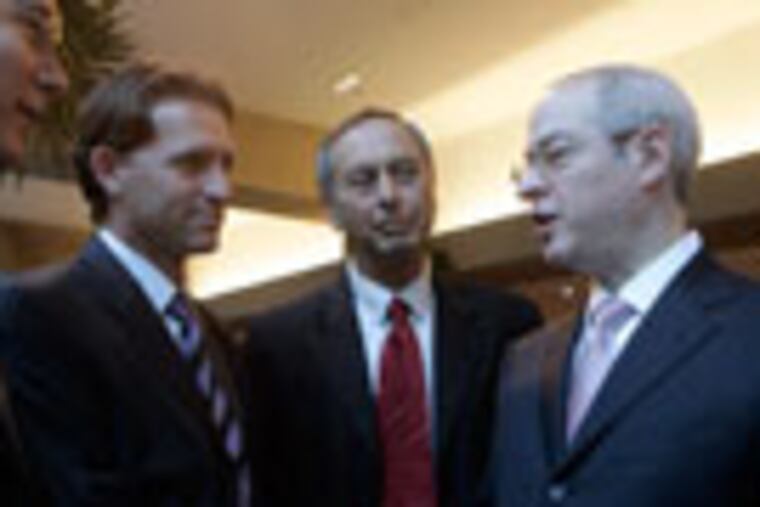Law firm connects Israeli tech firms, U.S. investors
The high-tech and life-sciences industries in Israel are among the world's most robust, but it is to the United States that many of these companies turn for financing.

The high-tech and life-sciences industries in Israel are among the world's most robust, but it is to the United States that many of these companies turn for financing.
And that is great business for a small clutch of U.S. lawyers who spend a good bit of time and energy connecting Israeli companies with American financiers, all in the hope that billable hours will follow.
For the lawyers, at least, that was the subtext yesterday at an all-day, invitation-only conference sponsored by Blank Rome L.L.P. for Philadelphia-area investors and 20 Israeli high-tech and life-sciences companies seeking U.S. financing.
Israel is a cauldron of technology and biotech innovation, along with traditional pharmaceutical research.
The more deals the Israelis do in the United States, the better it is for their American lawyers.
"They're looking primarily for financing, but also strategic relationships," said David Gitlin, a Blank Rome partner whose practice focuses in part on the firm's Israeli commercial clients, who number in the dozens. "Our philosophy is that the more our clients succeed, the more they will generate legal work."
The Blank Rome conference, where Israeli companies touted products ranging from new data-protection software to wireless technology for remote reading of gas and water meters to an interactive Web site for teenage girls enthralled with the Saddle Club series of books, had a narrow focus.
But the underlying theme is playing out in law firms - and most professional-services firms - all across the nation.
Lawyers are under pressure as never before from clients to climb down out of ivory towers and join the fight - not only for business, but, in some instances, simply to survive.
In current lawyers' parlance, that means aligning the interests of the firm with those of the client. As a practical matter, lawyers are now finding themselves doing a lot of things that never were foreshadowed by their law-school texts.
Most big firms have large marketing departments whose job is to corral new business and keep the clients they have. Young associates are urged to imagine themselves in the place of their clients, meaning: Be extra sensitive about charges.
And so, the Blank Rome conference, organized by Gitlin and another of the firm's lawyers, Beth Cohen, was billed as a client service. Some of the Israeli firms that made presentations already were clients.
The firm devoutly hopes that other presenters soon will join the client list. Overall, there are 15 lawyers at Blank Rome who focus on Israeli companies.
Most of the lawyers speak English and Hebrew; several are licensed to practice in Israel. Their work for Israeli clients includes assisting with the acquisition of U.S. real estate, ensuring compliance with U.S. financial regulators, and protecting intellectual property.
But there was little legalese in the air yesterday. Business jargon was the order of the day.
One investment professional, querying an Israeli executive whose company, Mobideo Aerospace, had developed an electronic service manual for aircraft that prompts technicians and allows supervisors to monitor their work, wanted to know what the company's monthly "burn rate" was. Translation: How quickly was the company going through its investment capital?
Another investor queried a technology company executive about the possibility that an already established competitor might block its entry into the market.
Not to worry, the executive said, they were selling their product at a different price point, meaning that smaller customers attracted to the firm's lower prices would be their market.
For entrepreneurial lawyers such as Gitlin and Cohen, who began the conference with Israeli companies and investors six year ago, a sizable hurdle is overcoming Philadelphia's relatively low profile as a center of innovation and investment.
Boston has had more success in attracting Israeli start-ups - there are about 70 in the Boston region now - in part because that city has a much larger venture-capital sector, drawn to its biotech research and development and its high-tech industry.
"People know less about Philly, so it is more of an education process," said Gitlin.
Yet the region has its strengths, said Richard Fox, managing director of Cross Atlantic Capital Partners of Philadelphia, one of the investors at the conference.
"With all of the pharma in this region, this is a natural place for Israelis to invest," he said.